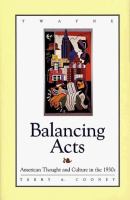Balancing Acts: American Thought and Culture in the 1930s
- Binding: Paperback
- Publisher: Twayne Publishers
- Publish date: 01/01/1995
Description:
The 1930s were a time of ongoing transitions and severe shocks, marked by the Great Depression, the New Deal, rising fears of fascism and totalitarianism, and the darkening clouds of war. The continuing modern evolution of mind-sets, media, and mores became intertwined in the thirties with efforts to develop a radical social thought, with renewed desires for permanent truths, and with recurrent debates over the nature of American values. Rather than rushing toward single-minded solutions, Americans more often favored "balancing acts" that blurred distinctions between old and new and deepened the search for a coherent national identity in the face of daunting challenges. In Balancing Acts: American Thought and Culture in the 1930s, Terry A. Cooney investigates the contradictions and tensions that marked the decade and effected earnest contemplation in a nation struggling to understand and shape its identity and development. He reveals a society battling to preserve and to escape tradition; exploring reconstructions of itself while seeking to safeguard valued liberties; and reaching toward national cohesiveness while embracing a more diverse and complex culture. The desire to move in all directions at once, simultaneously to live with and to resolve contradictions, appeared in the most sweeping public spheres and in the intimacy of nuclear families. Cooney examines the attitudes and ideas of intellectuals, the values and perceptions of ordinary citizens, and the directions of popular culture. He considers the attractions and limitations of radical ideas for prominent thinkers including Edmund Wilson, John Dewey, Sidney Hook, and Reinhold Niebuhr; for proletarian writers including MikeGold, Robert Cantwell, and Jack Conroy; and for the Partisan Review circle. Cooney looks at streamlining in design and architecture as an expression of values, and at "success books", advertising, movies, and radio. He discusses changing ideas about the nation and its make-up, intellectual shifts such as the anthropological redefinition of culture, New Deal policy toward Native Americans, and the dilemmas of activism among African Americans. Cooney considers the surge of social reporting during the 1930s and connects FERA investigators like Lorena Hickok and photographers like Margaret Bourke-White and Dorothea Lange with competing ideas about the worthiness of the poor and with evolving national myths. Finally, he looks at the debate over democracy surrounding the coming of World War II and locates the roots of the debate in shifting ideas about political and cultural order. Cooney suggests that people at many cultural levels, whether academic thinkers, popular writers, creators of mass culture, artists, workers or consumers, attempted in their own ways to balance the claims of individuality and self-reliance against the needs of community and system, calls for change against an attachment to continuities, and deep uncertainties against attempts at creative response. Cooney manages a graceful balancing act of his own as he analyzes issues of deep importance in an accessible and engaging style. In his sensitive examination of fundamental questions about diversity and heterogeneity in American life, he introduces a wealth of examples and illustrations ranging from gangster movies and Gershwin to political reform and formal thought. His clear and informed style, coupled with a novel andcompelling interpretation, makes Balancing Acts a lively narrative not only for ardent historians but for any enthusiastic reader.
Expand description
Product notice
Returnable at the third party seller's discretion and may come without consumable supplements like access codes, CD's, or workbooks.
| Seller | Condition | Comments | Price |
|
Wonder Book - Member ABAA/ILAB
|
Good |
$7.07
|
|
Montclair Book Center
|
Acceptable
|
$9.00
|
|
Wonder Book - Member ABAA/ILAB
|
Very Good |
$20.20
|
|
Bingo Used Books
|
Very Good
|
$29.16
|
|
GridFreed
|
New |
$109.71
|

Please Wait

